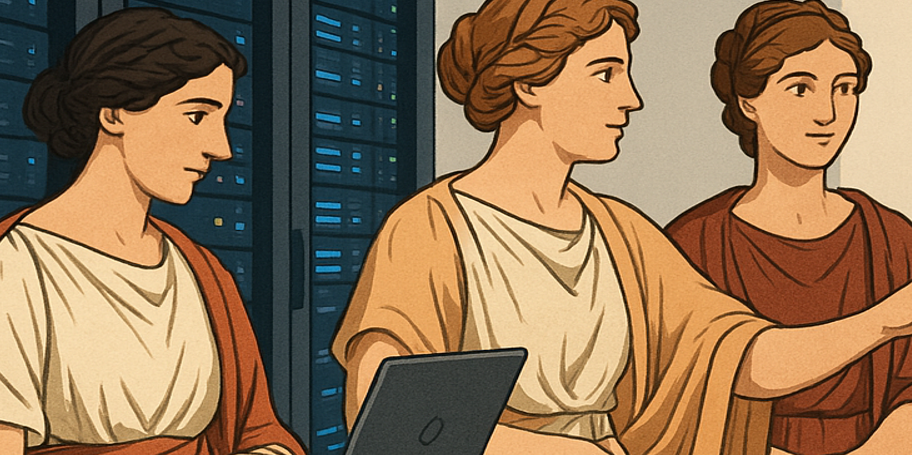1st International Congress (Online)

The rise of artificial intelligence has made it necessary to rethink not only how students are assessed, but also how historical research and teaching are carried out. The First International Conference on Innovation and Technology in Ancient History Education, held online and organized by the Area of Ancient History of the Department of Antiquity and the Middle Ages at the Universitat Autònoma de Barcelona (UAB), addressed this new landscape by exploring innovative solutions for the teaching of Ancient History and Archaeology.
On May 7–8, researchers and educators from around the world gathered in a virtual environment to discuss the challenges and opportunities posed by the application of AI and other technologies in the teaching and public dissemination of Ancient History. Topics addressed included strategies for assessment in the age of AI, the integration of digital tools to foster critical thinking, and ways to improve accessibility to historical knowledge for a broader audience.
The results will be published in the first volume of AI & Antiquity.
May 7th - 10:00 – 16:00 (CEST)
-- ANCIENT HISTORY AND AI. GLOBAL PERSPECTIVES --
10:00. Carlos Heredia - Welcome and presentation of the new journal AI & Antiquity
Universitat Autònoma de Barcelona – Universitat Oberta de Catalunya (Spain)
10:15. Edward Ross & Jackie Baines - Navigating the Fog: The Effectiveness of Personalized Conversational GenAI Models for Supporting Teaching the Ancient World.
University of Reading (United Kingdom)
10:45. Samandar Ro‘ziboyev. How is Artificial Intelligence Interpreting Ancient Texts?
Tashkent State University (Uzbekistan)
11:15. Menna Salah - Ancient Minds are Between Digital Time Capsules and Timeless Tales.
STEM ZAG Academy Art Head and Classical Studies (Egypt)
12.00-15.00. Break and Lunch ☕
15:00. Shu Wan - Finding Forgotten Women in Ancient China: Thinking ChatGPT-generated History Critically.
University at Buffalo (United States)
15:30. Caitlan Smith - AI Applications and Hindrances for Teaching Ancient Art History.
Arkansas State University (United States)
16:00. Final remarks and wrap-up
May 8th - 09:00 – 13:30 (CEST)
-- DIDÀCTICA, HISTÒRIA ANTIGA I INTEL·LIGÈNCIA ARTIFICIAL --
09:00. Carlos Heredia - Obertura de la jornada
09:15. Gerard Cabezas & Anna Rovira - Tecnologías emergentes aplicadas a la enseñanza de la Historia Antigua: el uso de la IA y modelos 3D. Investigador postdoc independent – Professora i psicopedagoga especialitzada en IA.
09:45. Ruth Hernández, Anna Sánchez-Caballé & Josep Benedito - De l’excavació al clic: innovació educativa en arqueologia a través d’una plataforma virtual.
Universitat Jaume I
10:15. Cristina Vidal, Mireia López, Mª Luisa Vázquez, Patricia Horcajada, Núria Feliu, Esther Parpal, Vanesa García - Inteligencia artificial y representaciones del pasado: estrategias docentes para visibilizar la diversidad de género y sexual en las culturas antiguas. Universitat de València – Universidad Complutense de Madrid
10:45 – 11:15. Pausa ☕
11.15. Marc Mendoza - Grècia Viral: Xarxes socials i divulgació en l’ensenyament de la història de Grècia. Universitat Autònoma de Barcelona
11:45. Cristina de la Escosura & Elena Duce - Enseñar Epigrafía Digital a través de IA: una experiencia docente desde la Historia Antigua.
Universidad de Alcalá – Universidad Autónoma de Madrid
12:15. Meritxell Ferrer - Aprenent AMB i DE la Intel·ligència Artificial: Experiències en l’ensenyança de la Història Antiga al Grau en Humanitats (UPF). Universitat Pompeu Fabra
12.45. Marco Almansa - Cicerón en el aula digital: IA y la oratoria clásica como herramienta didáctica. Universidad Complutense de Madrid
13.15. Cloenda del congrés

